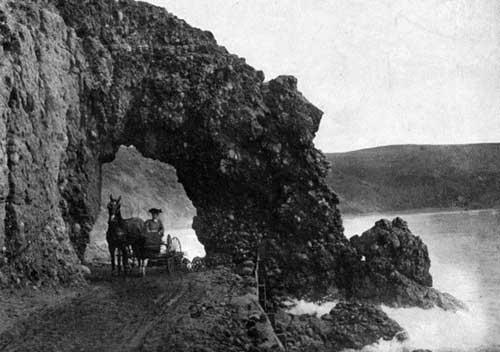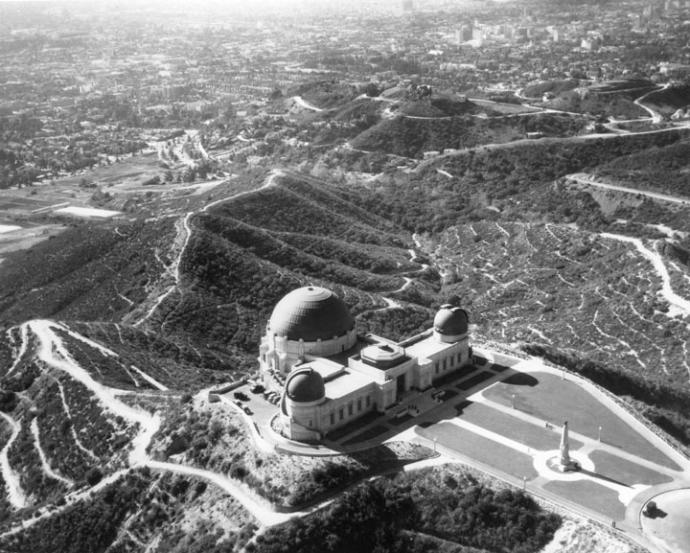I like looking at historical footage. The older I get, the more I look into the past. I like that it reminds us we are only a small part of this entire history. We shouldn’t be so self-centred as to think that we are more special or more important than those that came before us (not on an individual level so much, but societal, generational.) On the other hand, if we believe that our existence is entirely without meaning, then we likely won’t put any significant effort in, won’t attempt to make any impact, even on an individual those-who-are-in-our-inner-circle level, because there is no driving force behind it. Dependency and responsibility can breed purpose, yet too much of it is a weight on one's shoulder's, a noose around one's neck. So, as always, balance is in order. Reverence for the past, and especially for past sacrifices and hardships, but also enough abandon and imagination to at least allow for the possibility of improvement, new discoveries, and a slightly-better-than-it-was-before world. Plus, I think it takes at least some amount of pressure off, removing the focus from just ourselves, or looking inward too intensely or exclusively. So, I look at historical footage to tell my ass to stop feeling consumed by the current problems in the world and in my life, and get some f’ing perspective. And because it’s interesting.
When I was a kid, and admittedly even into my early twenties probably, I remember feeling like life just wasn’t as colourful back then. Intellectually I knew that they just had black&white TVs and that had little to do with the actual world they lived in, but I did somehow still recognize that it was having an impact on my idea of how they lived. I thought we had more – more options, more choice, more conveniences, more colour, less strife, and therefore a better life. But as I grew older, I realized just how much the past informs the future, and it didn’t really matter if their workaday utilitarian clothing, for instance, was made of men's suiting fabrics and therefore often blandly neutral and monotone. It reflected society. It always has. It was a suit. A suit of armour, but also of a worker bee. A signal to others, “We are modest, composed, sensible, professional, productive, contributing members of society. We prepare ourselves for the day, we look the part, and we know what roles we play.” Ah, so much clarity.
Today, we live in a time of non-conformity, comparatively speaking, and decidedly the most individualistic society we have ever known. There will always be abstract and societal forces at play, but generally speaking, we have infinitely more freedoms than our forefathers did. In many ways, we do as we please, yet the bounty of choice has its drawbacks, at times even overwhelming the mind. It's sink or swim, baby. And don’t get me started on how this unlimited freedom of choice and uncertainty breeds generalized [but potentially potent] anxiety – a rampant byproduct of today’s world. [Insert ‘The Paradox of Choice’ here. Look it up, if you desire.]
Yet where I once felt entirely lucky, in an absolute kind of way, today I realize we are in some ways unlucky. We are still at war. Some are with nations, yes, but within some countries and borders, we are in culture wars, and the push and pull of traditionalism vs. modernity, classicism vs. progressivism. I took a poll here and the results are: you are most concerned about the gender war and the political divide. I could probably write another take on the illusion of the often-heralded, glorious 1950s, yet how it wasn’t all it was cracked up to be (but that’s another topic.) Today, we excel at denial. Hardships are something to be countered and rebuked, not accepted with weak resignation. We believe the antidote to life's vicissitudes, and the road to happiness, is a swift and concerted removal of said negatives (rather than the alternate view of acceptance and a certain amount of stoicism that they will, without doubt, be a common and recurring aspect of our existence.) Discomfort and friction and suffering does not feel good. Yet in many ways we suffer less than our ancestors. The suffering contrasts the ease of the joy. We attempt to push the negatives away farther and faster than you can shake a stick at. But no one cares about sticks anymore. The jokes about this still pop up from time to time. “When I was a kid, we used to go outside, get some fresh air, and play with just a stick and a ball.” Huh? Did they ever really do that? Come on. Right after walking 5 miles in the snow, right? What a world, and how times have changed. What a bunch of softies we are, and yet, we're still complaining. Now we have Playstations, and X-Boxes, and enough digital media and on-demand self-directed entertainment, etc. to drown out all our sorrows (or just about. No, not really. But we try.)
What brought this on? I’m on the Smithsonian channel right now, and muted in the background is a documentary series called ‘Hell Below.’ It’s my first time seeing it. This episode is about U.S. submarine skippers “... changing the course of the WWII after entering the war and taking the fight to Japanese warships.” I’m going to be honest, I have always had pretty much zero interest in war strategizing (save for the fabulous film ‘The Hunt For Red October’ film – a masterpiece for its genre, in my opinion), and my high school history teacher who just played documentaries all the time and got us to hurredly fill in the blanks... well he certainly didn’t inspire or help instill any interest in it (though I think he would have much rather spent his days on a ship or in an aircraft during wartime, than stuck in a classroom with us.)
But there is some amazing footage, and seeing all the explosions, destruction, and dismay does help to remind one that these problems we are having today do, in many ways, pale in comparison. And, problems are just an inevitability of life. Some, relatively small compared to some such as life or death, or at least much less explosive than in the past. Otoh, wartime can actually bring people together, united in one cause. The imminent threat brings focus. Propoganda is a powerful thing. Enemies used to be known, and clear (but that was just an illusion, wasn't it?) Unanimous thinking is so much easier. From one angle, our problems today could be considered more complex, actually, more insidious, eating us from within. There's nothing civil about a civil war. This is what happens when ideologies divide, like genomes being split, or atoms on a molecular level.
'Cold Blue'
I like a good submarine, but what's better than submarines? Airplanes. ‘Cold Blue’ is a documentary depicting extremely rare footage of what it was like to be a fighter pilot inside the cockpit of a Boeing B-17, “one of the most iconic aircraft of World War II” and “the primary weapon of destruction the U.S. used in the air campaign to annihilate...” and help “bring Nazi Germany to its knees.” This is looong, too long, but fascinating. Aside from Hollywood, you’re not going to see actual cockpit battle footage like this anywhere else.
'Back in Time For Dinner'
Another interesting show is ‘Back in Time For Dinner’ and ‘Back in Time for Winter’ which are two Canadian productions, based on a British version of the same. '6 Weeks, 6 Decades' – each season focusing on a different Canadian family who has their house transformed, and themselves, to live in another decade, all the way from the 1940s up to the 2000s. They live, eat, dress, and spend their free time living just as they did in the past. The producers even find all the old appliances, tools, food, etc. that is authentic to the age. What it highlights and teaches us is how our lives have evolved, and how the events of the world so greatly impacted lifestyle. If there was wartime rationing, the modern family had to ration. If there was abundance, they splurged. It is an easily palatable reminder of how many comforts of modern life we now enjoy, and should not take for granted.
Conclusion:
Anyway, what it does, all of this historical footage, I think, is give us a window into the past, to remind us of what has already been learned, and what we should not forget. Perspective; a reminder that what we now see as needs, were once wants, or never even existed, yet somehow we managed. It’s just too bad that when the real life-threatening ones are removed, attained, and our basic needs are met, we move on to those of a more cerebral level, thus, we are never really done ruminating and worrying (Maslow’s Hierarchy of Needs.) So why keep reliving the same problems, making the same mistakes? I used to think that evolution was essentially about continual improvement, but then recently someone on GAG mentioned that organisms do adapt, do try things, yet sometimes revert back to the mean, or to a new something else. I was a bit taken aback. I didn’t know it could happen like that. But maybe I shouldn’t be so surprised, because we humans are doing it all the time. Sometimes, it’s ‘one step forwards, two steps back’... unfortunately. But perhaps we can instead draw from Dustin Hoffman’s tormented yet gifted ‘Rain Man’, with ‘One for good, two for bad.’ That makes it seem a little more manageable. It could be the ramblings of a broken mind, but within context, it is much more likely written as an awareness and distillation of taking and accepting the bitter with the sweet. They are, as we are with our brethren, indefinitely yet endlessly intertwined.
Or maybe it's like the Talking Heads jovially sing, even with all the changes, uncertainty, and unexpected turns in one's life, the world is "same as it ever was." Different, but the same. I do take some comfort in knowing that the sky isn't actually falling. Frogs might again, one day, start raining down, as in the movie 'Magnolia', and real life Florida, apparently, but we've got rooves over our heads, so we'll manage.
Which brings me to aerial and street photography of soon-to-be bustling cities under construction. No need to write anything about this, I just like it.
[Media Links:[







'Cold Blue' fighter pilot documentary:
https://www.popularmechanics.com/military/aviation/a27442948/cold-blue-b17-documentary/
'Once in a Lifetime', Talking Heads:
(Notice how I snuck another 'into the blue again' here, coming around full circle to the fighter pilot documentary. Ha.)
'The Hunt For Red October' film:
'Back in Time For Dinner' series:



Most Helpful Opinions